As far as book awards go, the ALA Youth Media Awards are the ones that matter the most to me. (For anyone who isn’t familiar with book awards, the ALA Youth Media Awards are announced in late January or early February and they include the Caldecott and Newbery medals) Readers’ choice awards are pretty important, too, but after that, as far as I’m concerned, the next most interesting book award is the Young People’s Literature category of the National Book Awards. This year’s winner will be announced tomorrow evening. Yet again, I have failed to read all of the nominees ahead of time. Out of the five titles on the shortlist, I’ve read two, am halfway through a third, and have read the very beginnings of the other two just so that I can tell myself that I’m familiar with them. That doesn’t really qualify me to be very opinionated about which book deserves to win this award, but for what it’s worth, here are my thoughts.
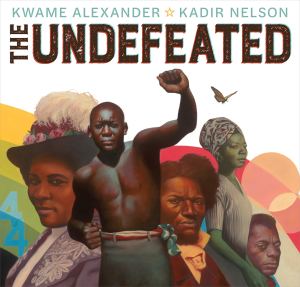 The Undefeated by Kwame Alexander, illustrated by Kadir Nelson
The Undefeated by Kwame Alexander, illustrated by Kadir Nelson
This one actually didn’t make the shortlist, but I’m including it just because it’s the only title on the longlist that I had read before the list was announced. It’s also the one with the youngest target audience. (The National Book Awards’ “young people’s literature” category technically covers both children’s and teens’ literature, but at least in recent years, it tends to skew towards YA, and it rarely gives much attention to picture books) The Undefeated is a nonfiction picture book about African American history, written in poem format. It’s pretty ambitious to try to do all of these things in one book, but this book succeeded, as long as the reader isn’t trying to use it to do extensive research on the subject matter. While it does contain historical and biographical information, it probably has more value as an inspirational poem than as an educational work. Although it’s well-written and beautifully illustrated, I can see why it didn’t make the cut and is no longer in the running for the National Book Award.
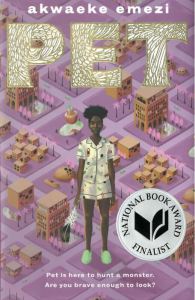 Pet by Akwaeke Emezi
Pet by Akwaeke Emezi
I’ve just barely begun reading this one, and don’t feel like I really have anything to say about it yet. It’s not really grabbing my interest, but sometimes, even if a book is very good, it takes a while for that to be obvious. This is definitely a story with very complex world-building, which makes it especially difficult to discuss when I’ve read so little of it. I will say that it seems to be very political and it has some religious connotations, and from what I’m seeing so far, I’m not seeing that as a positive thing.
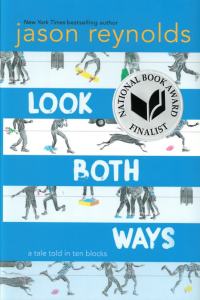 Look Both Ways: A Tale Told in Ten Blocks by Jason Reynolds
Look Both Ways: A Tale Told in Ten Blocks by Jason Reynolds
This collection of interrelated short stories mostly takes place on a single afternoon as a group of middle-school kids comes home from school. It’s realistic fiction; the stories center around normal (and sometimes mundane) situations like collecting change to buy candy, avoiding bullies and scary dogs, and planning a standup comedy routine that (spoiler alert!) no one comes to see. There’s a feeling of simplicity, partly because of the vernacular narrative voices and partly because there’s only so much that can happen in a short story that’s only a few pages long. There actually is a fair amount of characterization and character development, but not a lot of action, and that’s not a bad thing in this case. I’d recommend reading this book pretty quickly, ideally within just a couple days. It took me a couple of weeks to read it, and I felt like I had to reorient myself to the context every time I picked it up, which detracted from the overall experience. It was still interesting, but to me, it didn’t feel like it was up to the standard of most of Jason Reynolds’ previous books, and it didn’t feel quite worthy of National Book Award Longlist status. While I wouldn’t necessarily be surprised if it wins, it certainly wouldn’t be my top choice.
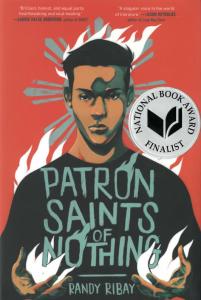 Patron Saints of Nothing by Randy Ribay
Patron Saints of Nothing by Randy Ribay
As of my writing this, I am only about halfway through this book, and while I am liking it so far, it feels like the kind of book that gets better later. Thus, at this point, I am undecided about whether or not I really want to see this win the National Book Award, but I give it my figurative stamp of recommendation. Patron Saints of Nothing is a coming-of-age type of story about a teenage Filipino American boy named Jay whose cousin was recently killed in the Philippines’ controversial war on drugs. Jay is understandably shocked and upset, even though it’s been a long time since he’s been directly in contact with this cousin. Suspecting that there are details he doesn’t know, and horrified by his uncle’s desire to cover up the whole incident, Jay travels to visit his extended family back in the Philippines. At this point, the book is reading like a mystery. Jay has been snooping in his uncle’s papers to hopefully find more information about his cousin, and his other cousin’s friend looks like she’s about to become an accomplice in his investigation.
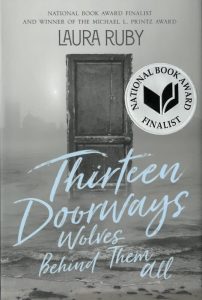 Thirteen Doorways, Wolves Behind Them All by Laura Ruby
Thirteen Doorways, Wolves Behind Them All by Laura Ruby
This is the other one of the two books that I’ve just barely begun, and I’m not nearly far enough in it to offer either a plot summary or an opinion. (I can specify the genre, though; it’s a historical fiction ghost story set in 1941 Chicago. Or at least, the beginning is) It seems promising. For one thing, this is the same author who wrote Bone Gap, which was also a National Book Award finalist and won the Printz award for YA literature. At the time, Bone Gap struck me as unique and intriguing because of its element of magical realism and because there’s something distinctive about the writing style. I was interested when I found out that Laura Ruby had a new YA novel this year, and it was high on my to-read list even before the National Book Award lists came out. So far, I feel like Thirteen Doorways, Wolves Behind Them All is living up to my expectations. Despite the fact that I admittedly only began reading it today, I’d be glad to see it win this award. Whether it does or not, I’m definitely planning to read it through to the end and I think there’s a good chance it’ll end up on my Best of 2019 list.
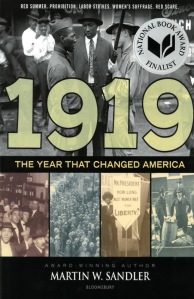 1919: The Year that Changed America by Martin W. Sandler
1919: The Year that Changed America by Martin W. Sandler
I really enjoyed this book; it was interesting and informative and I liked the general concept. As the title implies, it describes the major events that occurred in this country in 1919, but in doing so, it includes quite a bit of historical context and it touches upon the long-reaching effects of those events. In essence, it explores various social issues by zooming in on the status of those situations exactly a century ago. With that being said, the year 1919 truly was eventful enough to be an especially good focal point for such an examination. And yet it’s surprisingly underrepresented in historical fiction (and even historical nonfiction) for young readers. I’m editing out most of what I had intended to say about this book because I don’t want to spend the majority of this blog post on just one book. But as I delete those several hundred words of content, I’m realizing that my lengthy comments prove that this book was interesting and thought-provoking. (That’s despite the fact that I didn’t entirely agree with all of the opinions expressed, nor do I entirely approve of the amount of opinion that found its way into this factual history book.) I would strongly recommend this book to a teenage (or adult) history buff, and I’d be happy to see it win the award.